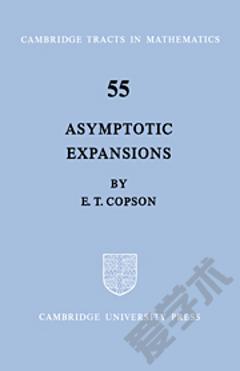Asymptotic Expansions
Certain functions, capable of expansion only as a divergent series, may nevertheless be calculated with great accuracy by taking the sum of a suitable number of terms. The theory of such asymptotic expansions is of great importance in many branches of pure and applied mathematics and in theoretical physics. Solutions of ordinary differential equations are frequently obtained in the form of a definite integral or contour integral, and this tract is concerned with the asymptotic representation of a function of a real or complex variable defined in this way. After a preliminary account of the properties of asymptotic series, the standard methods of deriving the asymptotic expansion of an integral are explained in detail and illustrated by the expansions of various special functions. These methods include integration by parts, Laplace's approximation, Watson's lemma on Laplace transforms, the method of steepest descents, and the saddle-point method. The last two chapters deal with Airy's integral and uniform asymptotic expansions.
{{comment.content}}








 京公网安备 11010802027623号
京公网安备 11010802027623号